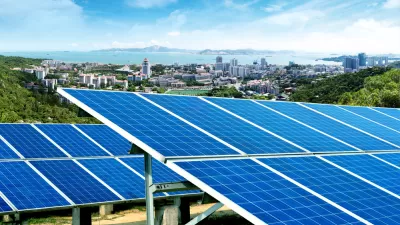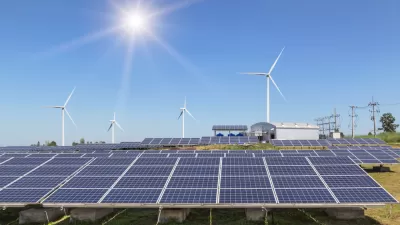In an effort to curb the state's greenhouse gas emissions, builders will be required to include solar power in many new commercial and large residential buildings.

The California Energy Commission on Wednesday voted to "require builders to include solar power and battery storage in many new commercial structures as well as high-rise residential projects. It is the latest initiative in the state’s vigorous efforts to hasten a transition from fossil fuels to alternative energy sources," reports Ivan Penn.
"The energy plan, which would go into effect on Jan. 1, 2023, also calls for new homes to be wired in ways that ease and even encourage conversion of natural-gas heating and appliances to electric sources." Because "[h]omes and businesses use nearly 70 percent of California’s electricity and are responsible for a quarter of its greenhouse gas emissions,""the proposals approved Wednesday would reduce emissions over 30 years as much as if nearly 2.2 million cars were taken off the road for a year."
Some cities in California already "have building codes that restrict or ban natural gas in new construction — 49 municipalities in all, according to the Sierra Club — but the changes advanced on Wednesday would greatly extend the push away from fossil fuels." With climate change contributing to some of the state's most devastating fires, residents have embraced solar power as a way to reduce emissions and cope with blackouts.
FULL STORY: California Panel Backs Solar Mandate for New Buildings

Planetizen Federal Action Tracker
A weekly monitor of how Trump’s orders and actions are impacting planners and planning in America.

Congressman Proposes Bill to Rename DC Metro “Trump Train”
The Make Autorail Great Again Act would withhold federal funding to the system until the Washington Metropolitan Area Transit Authority (WMATA), rebrands as the Washington Metropolitan Authority for Greater Access (WMAGA).

The Simple Legislative Tool Transforming Vacant Downtowns
In California, Michigan and Georgia, an easy win is bringing dollars — and delight — back to city centers.

The States Losing Rural Delivery Rooms at an Alarming Pace
In some states, as few as 9% of rural hospitals still deliver babies. As a result, rising pre-term births, no adequate pre-term care and "harrowing" close calls are a growing reality.

The Small South Asian Republic Going all in on EVs
Thanks to one simple policy change less than five years ago, 65% of new cars in this Himalayan country are now electric.

DC Backpedals on Bike Lane Protection, Swaps Barriers for Paint
Citing aesthetic concerns, the city is removing the concrete barriers and flexposts that once separated Arizona Avenue cyclists from motor vehicles.
Urban Design for Planners 1: Software Tools
This six-course series explores essential urban design concepts using open source software and equips planners with the tools they need to participate fully in the urban design process.
Planning for Universal Design
Learn the tools for implementing Universal Design in planning regulations.
Smith Gee Studio
City of Charlotte
City of Camden Redevelopment Agency
City of Astoria
Transportation Research & Education Center (TREC) at Portland State University
US High Speed Rail Association
City of Camden Redevelopment Agency
Municipality of Princeton (NJ)





























